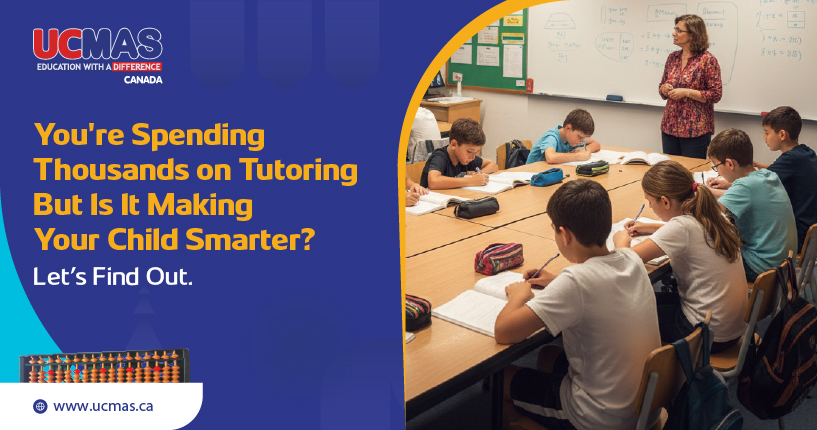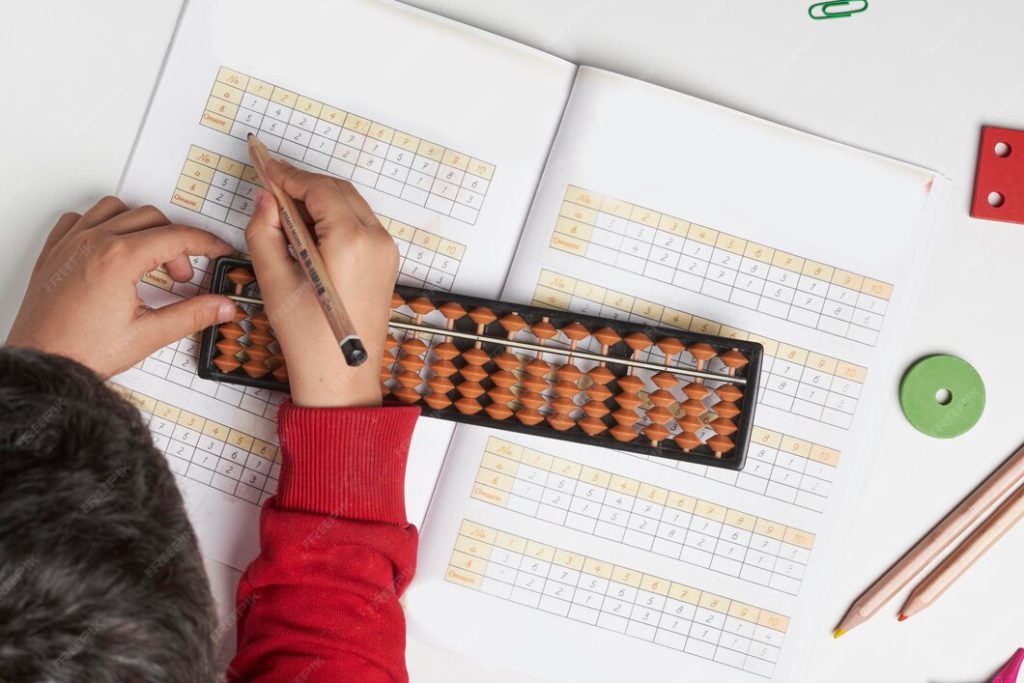
Your child struggles with math homework. You search for “math tutors near me” and instantly get dozens of results. Traditional tutoring feels like the obvious answer: more worksheets, more practice, more one-on-one help. But then, you hear about abacus math and programs that don’t just focus on homework but claim to boost memory, focus, and even creativity.
So, which path should you be choosing, math tutoring or brain training? Let’s explore both these options and understand their differences, so you can make the right choice for your child.
Why Math Tutoring Feels Like the Right Choice
Math tutoring has been a trusted solution for generations. A skilled tutor breaks down tricky concepts, revisits weak areas like fractions or long division, and patiently explains what wasn’t clear in class. Homework gets completed more accurately, lessons are aligned with the school curriculum, and over time, children start feeling more confident. In many cases, tutoring brings quick results, grades improve, tests feel less overwhelming, and the child gains a sense of support.
However, as many parents eventually discover, tutoring often addresses the surface, rather than the root. Once the support is paused, old struggles return, especially if a child’s focus, memory, or confidence hasn’t been strengthened. That’s where abacus math takes a different approach. It’s a brain tutoring program that works at a deeper level, so children can build lasting skills rather than just temporary fixes.

What Brain Training with Abacus Math Does Differently
Unlike traditional math tutoring, which focuses on grades and homework, abacus math taps into something deeper; it reshapes the way a child’s brain processes information, thus building a strong foundation for early childhood education. This approach is less about rote learning and more about building lifelong mental agility.
1. It Builds Whole-Brain Connectivity
Through use of the 6-finger technique, it works on the whole brain development in children; thus activating both the left and right hemispheres of their brain. This leads to better memory retention, focus, and visualization skills.
2. Sharpens Mental Math Skills
With consistent practice, children learn to solve problems without depending on calculators or even pen and paper. This boosts speed, accuracy, and confidence in handling numbers.
3. Enhances Cognitive Skills Beyond Math
Brain training with an abacus develops concentration, problem-solving skills, and logical reasoning that can be applied to reading, science, and everyday decision-making.
4. Fosters Independence and Confidence
Unlike tutoring, which can sometimes create reliance, abacus math helps kids trust their own abilities. They become more independent learners, ready to tackle challenges without constant guidance.

Parents often find themselves torn between searching for “math tutors near me” for quick academic support or exploring abacus math programs that build long-term skills. Both approaches have value, but they work in very different ways.
Here’s a clear side-by-side look to help you decide what fits your child best:
| Aspect | Math Tutoring | Abacus Brain Training |
| Primary Focus | Helps with homework, clarifies school concepts | Builds whole-brain development through abacus math |
| Short-Term Impact | Quick grade improvement, better test scores | Gradual improvement in focus, memory, and problem-solving |
| Long-Term Benefits | Benefits may fade if tutoring stops | Lifelong skills in visualization, logic, and confidence |
| Learning Approach | One-on-one explanation, practice worksheets | Hands-on abacus intelligence, mental math techniques, and brain training |
| Skills Gained | Better understanding of the current syllabus | Stronger focus, sharper recall, creativity, and resilience |
| Best For | Children who need immediate academic support | Children who need long-term cognitive growth and independence |
So, What’s the Right Choice for Your Child?
The truth is, parents don’t have to pick one over the other. Many families use tutoring to address immediate academic needs while enrolling in brain training to develop long-term skills. The key is to understand what you want for your kid.
Do you just want them to pass the next math test, or do you want a complete brain development program that makes them independent, confident learners for life? Answering this simple question will help clear your dilemma.

Build a Brain That’s Ready for Anything
The choice between tutoring and brain training isn’t just about fixing today’s problems—it’s about building tomorrow’s capabilities. At UCMAS, we combine abacus-based mental math with whole-brain development to enhance concentration, memory, visualization, and problem-solving skills that last a lifetime.
Whether your child needs academic support or you want to unlock their full potential, we’re here to help. Learn more about our Abacus Math Program and explore how UCMAS provides math tutoring support to our children.
Book a Free Info Session on our website to learn what’s the right fit for your child. Because learning should be about building minds, not just memorizing answers.
FAQs
1. How is brain training different from traditional tutoring?
Tutoring focuses on specific subjects or school topics, whereas brain training targets underlying skills such as memory, attention, and problem-solving. Both can help, but brain training is aimed at long-term improvement.
2. Can tutoring and brain training be done together?
Yes, many families combine the two. Tutoring addresses immediate academic needs, while brain training strengthens the foundation, making future learning easier.
3. Which option shows results faster—tutoring or brain training?
Tutoring usually shows quicker results in tests and homework, whereas brain training takes time but creates lasting changes. The choice depends on whether you need short-term support or long-term growth.
4. What type of child benefits most from brain training?
Brain training is especially useful for children who struggle with focus, memory, or confidence. It helps them build the mental tools they need to handle any subject more effectively.
5. Is tutoring only for struggling students?
Not at all. Even students who excel can benefit from tutoring to refine their skills, prepare for exams, or stay ahead of the curriculum.
6. Does brain training replace school learning?
No, it complements it. Brain training builds the skills that make learning at school easier and less stressful, but it doesn’t replace classroom teaching.
7. How long does it take to see results from brain training?
Every child is different, but many parents notice improvements in focus and confidence within a few months. The benefits continue to grow as training becomes consistent.
8. How do parents decide between tutoring and brain training?
It often depends on what the child needs most. If the problem is catching up in a subject, tutoring helps; if the challenge is attention, memory, or processing skills, brain training might be the better fit.





